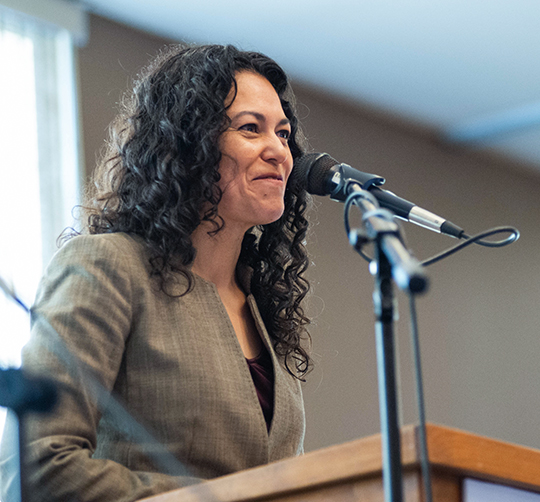Two Nations One Water Summit 2019 Held in Las Cruces, NM
By Will Keener, NM WRRI contributing writer
Water is life. Water is for fighting.
Mindful of these two old adages in the water community, U.S. Rep. Xochitl Torres Small suggested a newer refrain Wednesday, April 24, 2019 at the second annual Two Nations One Water Summit in Las Cruces. Her idea: “Water is about working together.”

Congresswoman Xochitl Torres Small, New Mexico 2nd District, gave the welcome to those gathered for the Two Nations One Water US-Mexico Border Water Summit, 2019, at the New Mexico Farm and Ranch Museum, Wednesday, April 24, 2019
Torres Small, a water attorney elected to represent New Mexico’s 2nd District in November, told audience members they needed to accept the available science but also be open to new challenges in negotiating solutions. “The best parts come when we work together,” she said. Torres Small cited the recent restructuring of an agreement among the Colorado River basin states to cope with an ongoing drought, as an example of the cooperation possible. “All participating states endorsed the agreement, Congress passed it, and the president signed it,” she said, proving that water entities can cooperate.
Her remarks appeared to resonate with other speakers throughout the day. “We’ve seen how crucial it is to have strong partnerships,” said Ed Archuleta, director of Water Initiatives at University of Texas at El Paso (UTEP,) a 50-year veteran in the water and wastewater field, and event co-chair. “What we are doing here is about collaboration.”
The conference, hosted by the New Mexico Water Resources Research Institute, UTEP, New Mexico State University (NMSU), and Texas A&M, began Tuesday with tours at the Bureau of Reclamation’s Brackish Groundwater National Desalination Research Facility in Alamogordo. Another tour was scheduled Friday at NMSU. Wednesday and Thursday presentations and discussions were held at the New Mexico Farm and Ranch Heritage Museum in Las Cruces.
Among the nearly 250 attendees – predominantly from Texas, New Mexico, and Chihuahua, Mexico — are academics, officials from local, federal and international agencies, interested consultants, and border community members. Engineers, water planners, researchers, and private industry representatives also attended. “There has been a clear shift among those interested in water issues,” said Sam Fernald, WRRI director. Emphasis is no longer on whether climate change will occur, but on how to deal with impacts already happening, he said. “That’s the reason we are happy to host this group.”
